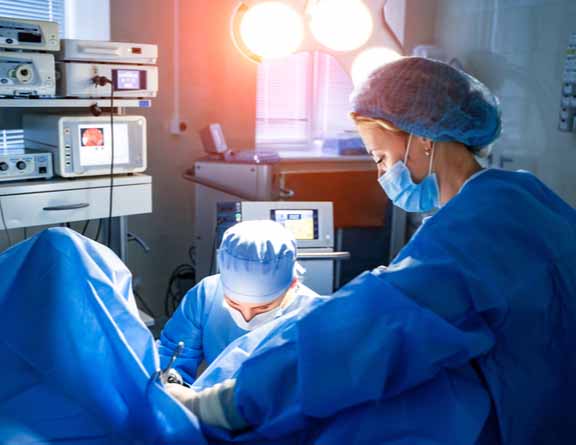
Aurangabad
Abortion is the termination of unwanted pregnancy, and there are two types of abortions: medical abortion and surgical abortion. Medical abortion, also called medical termination of pregnancy, involves the usage of medicines or a combination of drugs to terminate the pregnancy. Surgical abortion, also known as surgical termination of pregnancy, is a procedure during which the obstetrician-gynecologist uses surgical instruments to remove the pregnancy from the uterus.
Licensed Clinics
Certified Female Gynecologists
Confidential Consultation
No-cost EMI


Treatment
Diagnosis
The OB-GYN recommends pelvic ultrasound to confirm the duration and type of pregnancy (such as normal, ectopic, or molar pregnancy.) In addition, the OB-GYN also recommends blood and urine tests to check if you are anemic or have any other medical conditions, such as diabetes, high/low blood pressure, or sexually transmitted diseases. This helps the doctor ensure there is no risk of complications during or after abortion.
Procedure
The OB-GYN recommends pelvic ultrasound to confirm the duration and type of pregnancy (such as normal, ectopic, or molar pregnancy.) In addition, the OB-GYN also recommends blood and urine tests to check if you are anemic or have any other medical conditions, such as diabetes, high/low blood pressure, or sexually transmitted diseases. This helps the doctor ensure there is no risk of complications during or after abortion.
When medical abortion fails, pregnancy exceeds nine weeks, or miscarriage becomes incomplete, the obstetrician-gynecologist uses surgical instruments to end the pregnancy.
First, the obstetrician-gynecologist gives anesthesia to the patient. Due to anesthesia, the patient doesn’t feel pain or discomfort during the entire surgical abortion process.
During the process, the OB-GYN dilates the cervix, places a small suction tube inside the uterus, and uses the suction to remove embryo and pregnancy tissue from the uterus altogether.
Certified Female Gynecologists. Quick & Rapid Recovery.
Our team consists of the top gynecologists in India with extensive experience in performing medical and surgical abortions and ensuring the patient faces minimal discomfort in the process.
We ensure 100% confidentiality of the patients seeking an abortion. The patient’s identity and all other associated details are kept safe and aren’t divulged to anyone, so the patients do not have to worry about their privacy.
To help patients manage the expense of their abortion, we provide No Cost EMI offers. By availing of these offers, patients can pay for their abortion in convenient and affordable monthly installments.
We put together a comprehensive, all-inclusive treatment experience for patients. Patients receive complete medical assistance from our care coordinators, starting from the initial consultation to follow-up care.
If you need to get a medical or surgical abortion, you should always consult a certified doctor who has a valid license for termination of pregnancy. Usually, gynecologists, and OB-GYN perform abortions at a legal clinic.
The cost of abortion in Aurangabad may cost you from Rs. 10,000 to Rs. 40,000. The final price may vary as it depends on factors, such as duration of the pregnancy, doctor’s fee, type of surgery or method chosen for abortion (surgical or medical), diagnostic tests, risks, etc.
Unsafe abortions can have adverse side effects on your health. It may lead to abnormal and sudden bleeding, infections, and other health problems as well. MTP carried out at Pristyn Care is safe and far away from all these complications.
Abortions are usually performed only till the end of second trimester. After the second trimester, undergoing abortion can have adverse effects on the female’s health and is not considered safe. In India, abortions are legal only until the 24 weeks pregnancy.
No, you will not bleed a lot after undergoing a surgical abortion. Surgical abortion doesn’t cause heavy bleeding. The bleeding is usually very light and ends within next 7-10 days.
Abortions/ Termination of pregnancies carried out outside of healthcare facilities and without any medical supervision are considered unsafe abortions. Due to the absence of medical expertise, these abortions have a high risk of complications associated with them. This is the reason why millions of women visit emergency rooms for abortion-related problems. Unsafe abortions are the major contributor to women’s deaths in India.
Therefore, it is extremely important that couples willing to undergo abortions seek proper medical advice for the procedure. Pristyn Care offers the safest and most advanced procedures for pregnancy termination in Aurangabad. The success rate of these procedures is high and has minimal risk of complications associated with them. Get in touch with us to consult the best gynecologists in Aurangabad for safe abortion (MTP).
Medical termination of pregnancy is a safe method for abortions performed only by skilled gynecologists. Many women and couples choose to go through MTP as a personal choice. Women may choose to undergo abortions if the pregnancy is unplanned, unsupported or if the family is unable to bear the financial and other responsibilities associated with bringing a child into the world.
In some cases, women decide to go for abortions if the pregnancy is harmful to their health. This happens if the woman has diabetes, hypertension, obesity, or other medical conditions like ectopic pregnancy (a condition in which the fetus grows inside the fallopian tubes instead of the uterus). Continuing the pregnancy in such cases can have adverse effects on the woman’s reproductive health and can even threaten the woman’s life. Therefore, abortion becomes a necessity in such cases.
According to a WHO report, 45% of abortions in developing countries are not carried out in a medically safe way. As a result, millions of women have to face the repercussions of unsafe procedures and in many cases, the complications pose a great risk to the female’s life.
Some of the common complications associated with unsafe abortions are listed below:
To avoid any of these serious complications, it is advisable to consult a qualified medical professional for the abortion procedure. A safe abortion will ensure a healthy life for both the female and the future offspring.
Before a surgical abortion, your OB-GYN evaluates your past health, including the medicines you are taking. Apart from that, the OB-GYN may do the following:-
A follow-up exam is usually done about 2 weeks after the surgical abortion. The exam may include the following:-
Apart from all the above, you may discuss the use of birth control. If birth control measures were started just after the abortion, the proper use of the method could be discussed again.
Also, you can ask all the questions that you have to your OB-GYN if you had an intrauterine device (IUD) inserted at the time of the surgical abortion.
After the surgical abortion, the OB-GYN will check your vital signs such as heart rate, breathing, and blood pressure to make sure that everything is normal.
After that, the OB-GYN checks the bleeding is not excessive and uterine contractions are normal. The OB-GYN also checks that the side effects from anesthesia are not causing problems.
The OB-GYN may also prescribe you certain medicines. This may include the following:-
Jaya Kashyap
Recommends
I had an abortion with Pristyn Care, and I am highly satisfied with their services. The doctors were kind and understanding, providing the necessary information and support. Pristyn Care's team ensured my comfort and privacy, making the process stress-free. Thanks to Pristyn Care, I had a safe and smooth experience, and I am thankful for their professionalism and care.
.svg)
.svg)
.svg)